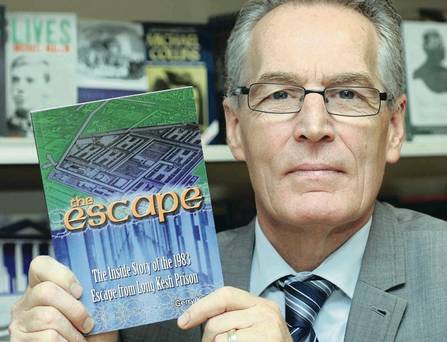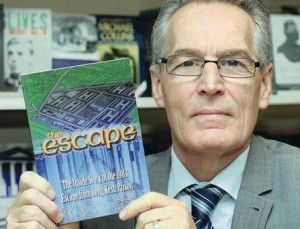Gerry Kelly will be in Derry tomorrow night to launch his book, “The Escape,” which tells the story of the escape of 38 republican prisoners from Long Kesh prison 30 years ago.
The Sinn Fein MLA will sign copies of the publication in the Sinn Fein centre at Rath Mor on Eastway in Creggan from 7.30pm.
Mr Kelly was one of 38 republican prisoners who escaped from the H Blocks in September 1983, regarded as one of the most daring jail breaks ever as Long Kesh was regarded as the “most secure jail in Western Europe.”
Speaking ahead of his visit to Derry, Mr Kelly said the escape – the biggest in British history – inflicted a “major political and military blow” to the British Government.”
“It showed to the outside world that despite the British Government’s claims that they had broken the spirit of republican POWs that, in fact it had the opposite effect.”
He concluded: I am looking forward to coming up to Derry where there is always a good reception, I would encourage people to come along for the Derry launch and book-signing.”
One prison officer died of a heart attack as a result of the escape and 20 others were injured, including two who were shot with guns that had been smuggled into the prison.
An official inquiry into the escape placed most of the blame onto prison staff, who in turn blamed the escape on political interference in the running of the prison.
Fifteen escapees were captured on the first day, including four who were discovered hiding underwater in a river near the prison using reeds to breathe.
Four more escapees were captured over the next two days, including Hugh Corey and Patrick McIntyre who were captured following a two-hour siege at an isolated farmhouse.
Out of the remaining 19 escapees, 18 ended up in the republican stronghold of South Armagh.
Ciaran Fleming, from Derry’s Waterside, drowned in the Bannagh River near Kesh in December 1984, while attempting to escape from an ambush by the Special Air Service (SAS) in which fellow IRA member Antoine Mac Giolla Bhrighde was killed.
When he escaped, Fleming had been serving a jail sentence after being convicted of the killing of RUC woman Linda Baggley in Derry in 1976.
Gerard McDonnell was captured in Glasgow in June 1985 along with four other IRA members including Brighton bomber Patrick Magee.
Séamus McElwaine was killed by the SAS in Roslea in April 1986 and Gerry Kelly and Brendan McFarlane were returned to prison in December 1986 after being extradited from Amsterdam where they had been arrested in January that year, leaving 12 escapees still on the run.
Pádraig McKearney was killed by the SAS along with seven other members of the IRA’s East Tyrone Brigade in Loughgall in May 1987,
In November 1987, Paul Kane and the mastermind of the escape Dermot Finucane, brother of Belfast solicitor Pat Finucane who was later killed by loyalist paramilitaries in 1989, were arrested in Granard, County Longford on extradition warrants issued by the British authorities.
Robert Russell was extradited back to Northern Ireland in August 1988 after being captured in Dublin in 1984 and Paul Kane followed in April 1989.
In March 1990, the Supreme Court of Ireland in Dublin blocked the extradition of James Pius Clarke and Dermot Finucane on the grounds they “would be probable targets for ill-treatment by prison staff” if they were returned to prison in Northern Ireland.
Kevin Barry Artt, Pól Brennan, James Smyth and Terrence Kirby, collectively known as the “H-Block 4,” were arrested in the United States between 1992 and 1994 and fought lengthy legal battles against extradition.
Smyth was extradited back to Northern Ireland in 1996 and returned to prison, before being released in 1998 as part of the Good Friday Agreement.
Tony Kelly was arrested in Letterkenny, County Donegal in October 1997 and beat an extradition attempt.
In 2000, the British Government announced the extradition requests for Brennan, Artt and Kirby were being withdrawn as part of the Good Friday Agreement. The men officially remain fugitives, but in 2003 the Prison Service said they were not being “actively pursued”.
Dermot McNally, who had been living in the Republic of Ireland and was tracked down in 1996, and Dermot Finucane received an amnesty in January 2002, allowing them to return to Northern Ireland if they wished to.
However. Tony McAllister was not granted an amnesty which would have allowed him to return to his home in Ballymurphy.
As of September 2003, two escapees, Gerard Fryers and Séamus Campbell, had not been traced since the escape.
Tags:







